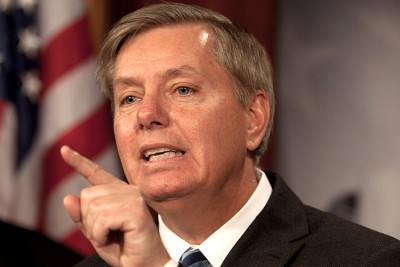Lindsey Graham: Defining Environmentalism Down
Voters Elect Parties, Not Individuals

The New Republic’s breathless headline this morning announces that Senator Lindsey Graham (R-SC), who today became the one millionth Republican to announce a Presidential bid, is “A Republican That Environmentalists Can Love.” Right on cue, The Christian Science Monitor just as breathlessly called Graham “The Republican Who Wants to Tackle Climate Change.” Obviously, Graham’s people are spinning the press heavily: what isn’t clear is why the press is buying it.
A few years ago, George W. Bush — or his speechwriter — coined a telling phrase regarding education policy: the “soft bigotry of low expectations.” (Bush’s commitment to education was sincere, if erratic.). The same phrase might apply to Graham. He simply acknowledges what is now the overwhelming scientific fact, i.e. that climate change is 1) real; 2) serious; and 3) human-made, and this is regarded as some sort of big breakthrough. The man has a lifetime League of Conservation Voters record of 11%: if environmentalists love that, then they are a very cheap date.
Graham genuinely wanted to get a climate change bill in 2010, but one reason why, as the Monitor piece delicately states, “negotiations crumbled,” is that Graham was simply unwilling to move forcefully and publicly in his own party to do something about it. And that highlights two very important points about the state of American politics:
1) Individuals don’t matter. Since we are approaching election season a scant 17 months before Election Day (ugh), we might as well get used to silly stories about who is the “real” Hillary Clinton or “real” Jeb Bush or Scott Walker or Ted Cruz or whomever. This vastly and grotesquely overstates the matter. Politicians are driven by political events and forces, and it is their actions that matter — not what they might really want to do in their heart of hearts given ideal conditions that never exist. Look no farther than the great American president, Abraham Lincoln, who held extremely firm convictions about slavery and union, and refused to compromise when the union was at stake: he freely confessed to a correspondent in 1864 that “I claim not to have controlled events, but confess plainly that events have controlled me.”
2) Parties do. America now has a Presidential system with Parliamentary parties, which is to say parties that have sorted themselves ideologically. The most conservative Democrat is more liberal than the most liberal Republican. This largely stems from two (linked) factors: 1) the disappearance of Dixiecrats; and 2) the extreme right-wing turn of the Republican Party (no, both parties did not become equally extreme). But what that means is that a President and congressional leaders have much less leeway to make cross-party trades: President Obama is finding that out with his rather bizarre attempt to pass the Trans-Pacific Partnership (where he is so far getting less than 20 Democratic House votes) and even then he has a strong centrist Democratic push behind him. Put most simply: in current American politics, we elect parties, not Presidents. And this is especially true given that from the President’s perspective, so much of policy depends upon executive branch officials to formulate and implement it. “Personnel is policy,” goes the old Movement Conservative saw, and it is correct. Dick Cheney surely knew what he was doing when, as related in Bart Gellman’s fine biography of him, he got George Bush to assign him the job of staffing executive agencies during the Florida recount. Whenever Cheney wanted something done, or something not done, he could be effective because his people were in the key positions.
A relative of mine insists that in Congressional elections, she votes “for the person, not the party.” She’s a wonderful person, but this is nonsense: nowadays, there is simply no difference between the two. If the Republican Party is going to come to its senses on the climate issue (not to mention every other issue), there will have to develop a cadre of climate realist Republicans who support each other and form a power base, and so far, none of them are anywhere to be seen.
So let’s nip this one in the bud. No environmentalist should love Lindsey Graham. And by the way, on his supposed strong suit, foreign policy, he’s wrong about everything, too.







Reader Comments